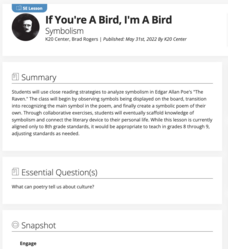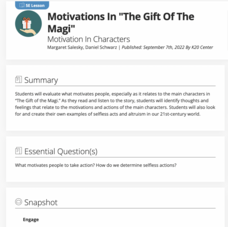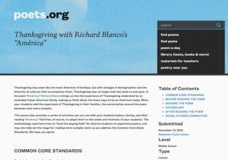K20 LEARN
If You're a Bird, I'm a Bird: Symbolism
Would a bluebird be as scary as a vulture? Edgar Allan Poe's "The Raven" is the central text in a lesson about symbolism. After a close reading of the poem, learners consider what the raven might represent to the narrator. They then...
K20 LEARN
It’s Never Too Late to Apologize: Character Development and Theme in “The Scarlet Ibis”
Sometimes saying I'm sorry just doesn't cut it. Scholars examine a series of apology poems, songs, and stories and consider each speaker's regrets. Using what they have learned, they analyze James Hurst's short story, "The Scarlet Ibis,"...
K20 LEARN
Just Say No!: Exploring Temptation Through The Lotus Eaters
Teenagers face many temptations, and just saying "No!" can be very difficult. Here's a lesson that provides some help. Learners use a Venn diagram to compare and contrast excerpts from The Odyssey, Tennyson's "The Lotus-Eaters," and the...
K20 LEARN
The Anatomy Of A Story: Story Structure
Somebody. Wanted. But. Then. Introduce your classes to the structure that supports stories with a instructional activity that teaches readers how to identify the four basic components writers use to craft their tales. After identifying...
K20 LEARN
The History of Spoken Word Poetry: Historical and Cultural Perspectives In Literature
Spoken word poetry, more than almost any other form, reveals the historical and cultural perspective of the poet. High schoolers listen to various spoken word poems, select one to research in-depth, and then apply what they have learned...
K20 LEARN
Memory Haiku: The Great Gatsby and the Sense of Smell
Scholars learn how smells evoke early childhood memories and apply that knowledge to a character from F. Scott Fitzgerald's The Great Gatsby. After finding a passage from the novel that references smells, they craft a haiku and a...
K20 LEARN
It’s My Party and I’ll Hear What I Want To: Gatsby’s Party Playlists, The Great Gatsby and the Sense of Sound
Young scholars consider how film soundtracks can help support not only the mood but also the tone of a scene. After viewing two very different trailers for the same film, class members create their own soundtracks for two party scenes...
K20 LEARN
Motivations In "The Gift Of The Magi": Motivation In Characters
O. Henry's short story, "The Give of the Magi," launches a study of what motivates people to act as they do. Class members identify what they believe are the motivations of the characters in O. Henry's tale and then craft a one-page...
K20 LEARN
That Which We Call a Rose: Connotation and Denotation in Romeo and Juliet
Words carry weight. And some words carry baggage. Scholars learn the difference in a study of connotation and denotation. Individuals sort the cards into three groupings using words from Shakespeare's play. After sharing within groups,...
K20 LEARN
The Consequences of Time Travel: Analyzing Short Stories
Ray Bradbury's short story "A Sound of Thunder" is the anchor text in a instructional activity that asks high schoolers to find examples of cause, effect, and foreshadowing in the tale. They then create a brochure advertising trips with...
K20 LEARN
Taking a Bite! Exploring Cultural Identity Through Food
High schoolers are asked to consider the connections between food, culture, and identity. They read articles and share what they learned in a jigsaw activity, read a short story, and make a claim about the story's theme, backing up their...
Global Oneness Project
The Importance of Indigenous Language Revitalization
Middle schoolers consider languages as representations of cultures and the importance of preserving various languages, especially the rapidly disappearing languages of indigenous peoples, in a lesson that tells the story of Marie Wilcox...
K20 LEARN
You Think You Have Problems: Perspective in Multi-Genre Literature
Young scholars are asked to reflect on how personal experiences might influence points of view and perspectives. They read poems and biographies of the poets and then match the poem to the poet. To justify their matches, learners...
Curated OER
Celebrate Joy Harjo: The First Native American Poet Laureate
Introduce middle schoolers to Poet Laureate Joy Harjo with a lesson that not only explains the role and duties of the Poet Laureate but also contains a video in which Harjo explains what she sees as her responsibility as a Native...
Academy of American Poets
Thanksgiving with Richard Blanco's "América"
Traditions, like the times, are a-changin'. Middle schoolers conduct a close reading of Richard Blanco's poem "América" and consider how Blanco's family approached his suggestions for adopting a new approach to their Thanksgiving meal.
Penguin Books
A Guide to the Works of Jacqueline Woodson
The works of Jacqueline Woodson introduce readers to diverse characters and themes. A guide covers many of the author's best-known books such as Brown Girl Dreaming and Locomotion. Dive & Discuss and Explore & Extend activities...

















